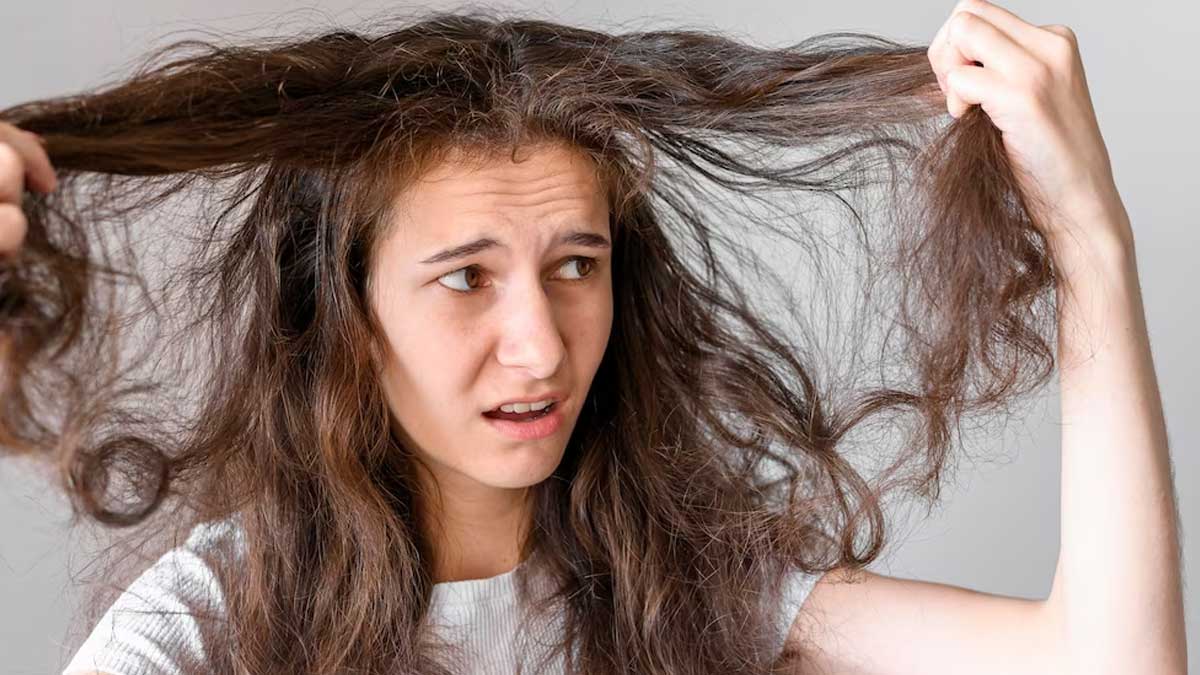
In a world where sleek, shiny, and perfectly styled hair seems to look beautiful, frizzy hair often becomes a matter of concern. Those untamed locks, defying gravity with their rebellious nature, can be a source of frustration for many. But, Ayurveda, the ancient Indian holistic system of medicine, offers a natural and effective approach to tame that frizz and restore your mane's lustrous glory. By harnessing the power of botanical remedies, Ayurveda provides a gentle yet potent solution to transform your frizzy hair into silky strands that command attention.
To know more about remedies to manage frizzy hair, Only My Health reached Dr Ganesh Chaudhary, an ayurvedic expert working at Primary Health Centre, Manigachhi, Bihar.
Ayurvedic Perspective on Frizzy Hair
According to Dr Chaudhary, frizzy hair is often a sign of excessive Vata dosha. Vata represents the elements of air and space, and when imbalanced, it leads to dryness, roughness, and lack of nourishment. Frizz is essentially a manifestation of this imbalance, causing the hair cuticles to lift and lose moisture, resulting in an unruly texture. Ayurvedic remedies for frizzy hair focus on restoring balance, nourishing the hair from within, and providing deep hydration to combat dryness.
Nature's Nourishment for Your Tresses
Amla
Amla, rich in antioxidants and vitamin C, is a powerful Ayurvedic ingredient for promoting hair health. Its natural conditioning properties help tame frizz and enhance shine. Create a nourishing hair mask by mixing amla powder with water or coconut oil, and apply it to your hair. Leave it on for 30 minutes before rinsing for a lustrous transformation.

Also read: 7 Ayurveda Recommended Foods You Must Try In This Heatwave
Brahmi
Known for its calming and cooling properties, Brahmi is an excellent herb for managing frizz. It nourishes the scalp, strengthens hair follicles, and promotes hair growth. Prepare a herbal rinse by steeping Brahmi leaves in warm water, strain the liquid, and use it as a final rinse after shampooing to add shine and combat frizz.
Coconut Oil
A staple in Ayurvedic hair care, coconut oil penetrates deep into the hair shaft, providing intense moisture and nourishment.
Warm up a few tablespoons of coconut oil and gently massage it into your scalp and hair. Leave it overnight or for a few hours before washing it off. This luxurious treatment will leave your hair feeling softer, smoother, and frizz-free.
Shikakai
Derived from the fruit pods of the Acacia concinna tree, shikakai is a natural cleanser that maintains the hair's natural oils while preventing frizz. Mix shikakai powder with water to form a paste and use it as a gentle alternative to chemical-laden shampoos. Regular use will cleanse your hair without stripping it of essential oils, leaving it healthy and manageable.

Aloe Vera
This versatile plant has incredible hydrating properties that work wonders on frizzy hair. Extract fresh aloe vera gel from the leaf and apply it to your scalp and hair. Let it sit for 30 minutes before rinsing. Aloe vera soothes the scalp, moisturises the hair, and imparts a smooth and glossy appearance.
Also read: Doctor-Verified Ayurveda Tips For Summers According To Your Dosha
Incorporating Ayurveda into Your Hair Care Routine
Apart from these Ayurvedic remedies, it is crucial to follow a holistic hair care routine. Protect your hair from excessive heat and styling tools, minimise chemical treatments, and avoid harsh shampoos containing sulphates and parabens. Additionally, maintain a healthy lifestyle by staying hydrated, eating a balanced diet, and managing stress levels, as they all contribute to the overall health of your hair.
Although this article is based on expert inputs, it is highly recommended that you should consult with your own doctor, and get the condition diagnosed.







